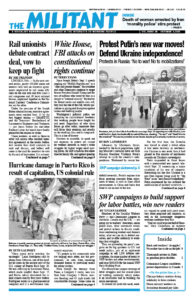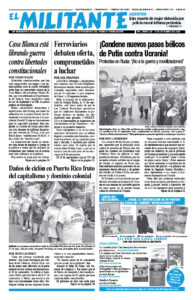Advances by Ukrainian forces, backed by the local population, fighting Moscow’s invasion have set back Russian President Vladimir Putin’s attempt to crush the country’s independence. Weakened by recent battlefield reversals, Putin’s regime also faces growing pressure from opponents at home, as well as from allied governments in China and India that want to see an end to the war.
For the first time, the Kremlin was forced to admit a defeat when it lost more territory in northeastern Ukraine in one week than it had gained in five months of murderous assaults on Ukraine’s sovereignty.
Putin responded to these losses with a prerecorded war speech televised Sept. 21 announcing a major escalation of his war of conquest. Reiterating his lies that Ukraine is a neo-Nazi regime being used by “the West” as an “anti-Russia bridgehead,” Putin announced he has ordered the mobilization of military reservists — the first time this has been done since the Second World War — to supplement his troops currently deployed in Ukraine.
In a classic example of turning the victim into the criminal, Putin blamed Kyiv for the war, saying its popular forces were inflicting torture and murder against civilians, and were planning attacks in Russia.
He reported that referenda were going to be organized in Moscow-occupied areas in Donetsk, Luhansk, Kherson and Zaporizhzhia Sept. 23-27 to incorporate them into Russia proper. He claimed they were “historical lands of Novorossiya,” not part of Ukraine. The threat is that any further Ukrainian efforts to liberate these areas — where active counteroffensives by Kyiv are underway — would be responded to as an attack on Russian soil.
Putin concluded his address with a threat of nuclear attack. “In the event of a threat to the territorial integrity of our country,” he said, “we will certainly make use of all weapon systems available to us. This is not a bluff.”
After Putin’s speech, Russian Defense Minister Sergei Shoigu told the press that Moscow would call up 300,000 reservists, beginning immediately. He extended the contracts for Russian soldiers already in Ukraine indefinitely.
Moscow’s moves underscore the fact that Putin’s forces are losing ground. Demoralization is widespread. When Ukrainian forces retook the city of Izium Sept. 10, part of their successful counteroffensive in the Kharkiv province that reconquered over 3,000 square miles, they found handwritten letters left behind by fleeing Russian soldiers. Complaining of “physical and moral exhaustion,” the dispirited men asked their officers to relieve them of their duties.
Protests against the war and mobilization began across Russia shortly after Putin’s talk. Most were modest and were met with police retaliation and arrests, as such actions are illegal. They started in Siberia and the Far East, with actions in Irkutsk, Ulan-Ude, Yakutsk, Khabarovsk, Tomsk, Novosibirsk and other cities.
Even before Putin’s speech, protests had picked up across Russia. The Kharkiv Human Rights Protection Group publishes a weekly list of such protests. The latest runs 19 pages. It includes a billboard put up in Angarsk in eastern Siberia that reads, “40,000 killed, 100,000 wounded. What for? NO TO THE WAR! 150 days of the ‘special’ operation have cost 1 trillion dollars.”
Virtually all flights out of Russia were booked after the announcement. Flights to Georgia, Turkey and Armenia, which don’t require visas for Russians, were sold out within minutes. Then no more tickets were available for Azerbaijan, Kazakhstan, Uzbekistan and Kyrgyzstan. Russia’s stock market plunged.
‘Defeat Putin’s invading forces!’
“The Socialist Workers Party hails the resistance of Ukrainian working people and calls for the defeat of Putin’s invading forces,” Alyson Kennedy, SWP candidate for Texas governor, said Sept. 21. “We stand with Russian toilers protesting Moscow’s war. The defense of Ukraine’s independence is in the interests of working people worldwide.”
Ukrainian President Volodymyr Zelensky said his forces will press on with their efforts to liberate all Ukrainian territory seized by Russian forces. He said Putin’s mobilization order was a response to his troops’ failings on the battlefield. “He sees that his units are simply running away,” Zelensky told German BILD TV. He “wants to drown Ukraine in blood, including the blood of his own soldiers.”
One of the first governments to protest Putin’s moves was his erstwhile ally in Beijing, which has become increasingly vocal in opposing Moscow’s invasion of Ukraine as it drags on. “China’s position on the Ukraine issue is consistent and clear,” Wang Wenbin told the press, speaking for the Chinese Foreign Ministry. “We believe all countries deserve respect for their sovereignty and territorial integrity.”
A few days earlier, at a summit meeting in Uzbekistan, Putin admitted after meeting with Xi Jinping that the Chinese president had expressed “questions and concerns” about the war. Chinese-owned telecom giant Huawei, and other companies in China, have stopped sales in Russia, honoring Washington’s sanctions.
“Today’s era is not of war,” Indian Prime Minister Narendra Modi chided Putin at the same meeting. He called on Putin to find “the path of peace.”
Setbacks for Moscow
After pushing Moscow’s forces out of the Kharkiv region, Ukrainian forces have begun retaking parts of Luhansk, an area Moscow seized in July after months of intense fighting. They ran up the Ukrainian flag in the village of Bilohorivka Sept. 19.
These extensive losses show Putin’s invasion was based on a complete misjudgment about the capacities and courageous determination of the Ukrainian people to defend their country and its independence.
In the south, Ukrainian forces are targeting Russian strongholds and supply lines in a counteroffensive near the occupied Black Sea port of Kherson. The collapse of Moscow’s forces around Kharkiv punctured Putin’s false claim that the Ukrainians are really Russians and the Ukrainian nationality doesn’t exist. Resistance in occupied areas, particularly partisan activity in Melitopol, has increased.
Moscow responded to these losses with a round of missile strikes against civilian targets and infrastructure in major Ukrainian cities. This reflects the brutality of the Russian political and military leaderships, who target working people. More than 400 bodies were found in a mass grave in Izium after Ukrainian forces retook the city. Russian police had tortured Ukrainian prisoners in a basement with electric shocks.
Instead of showcasing the Putin regime’s power and military might, the war is highlighting its weakness. During the Ukrainian counteroffensive in Kharkiv, demoralized Russian troops abandoned hundreds of tanks and other armored vehicles and large numbers were taken prisoner or decided to turn themselves in.
Recognizing the poor state of its troops, Moscow responded Sept. 20 by ramping up penalties for soldiers who disobey orders, the same day Putin announced his call-up of reservists. Wagner Group financier Yevgeny Prigozhin announced that any deserters from his mercenary forces deployed in Ukraine will be executed.
The war has also shined a spotlight on problems with the Kremlin’s weaponry. Russia has been the world’s second-largest weapons exporter. But based on evidence from Ukraine, the governments of India and the Philippines recently scrapped major agreements to buy Russian military helicopters.
The Russian air force is largely unable to operate over Ukrainian-held territory, nor effectively protect Moscow’s bases in Crimea.
Putin had anticipated that governments in Europe, especially Berlin, would increasingly soften their opposition to the invasion because of their decadeslong dependence on Moscow for energy sources. But under the pressure of Kyiv’s gains on the ground, the German government has further shifted course from this reliance. The German rulers nationalized three oil refineries owned by Russian oil giant Rosneft Sept. 16.
This reflects the fact that Putin’s war — the largest on European soil since the Second World War, with no end in sight — has shaken up the imperialist “world order,” causing deepening shifts in the way capitalist rulers worldwide look to most effectively defend their own national interests. This is leading to new alliances and massive rearmament.


